‘First Nations Version’ Bible Translation Released: Is It The Worst Ever? A Review
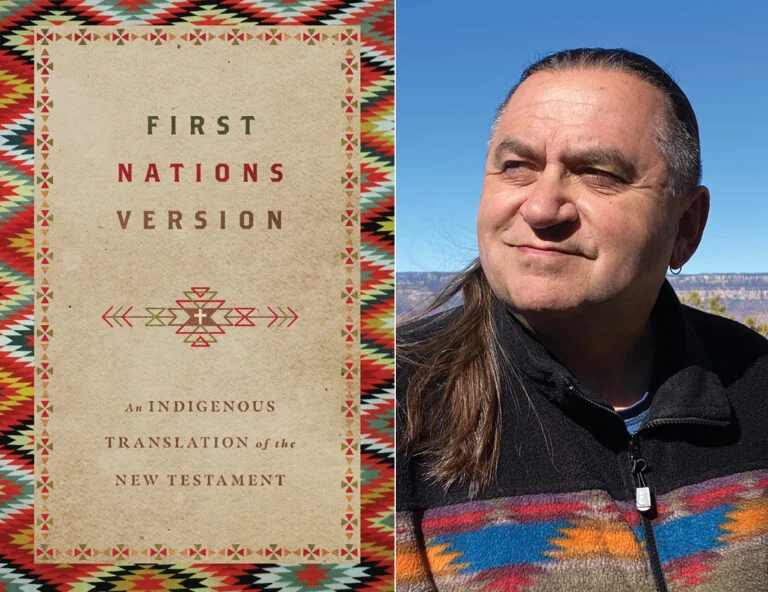
A new Bible translation has been released, the ‘First Nations Version’ (FNV) and right away one thing is clear: this is an absolute trainwreck of a translation. This is because the FNV is not a word-for-word translation; rather, it is a thought-for-thought translation/ dynamic equivalent translation, which means it’s nothing more than a paraphrase, and not a particularly good one at that. It’s another entry into the long line of GistBibles. I.e it’s more or less the gist of what the scriptures say. For this reason, it cannot be considered a translation in any way, shape or form.
Released in the last few days, it’s selling too, either topping or being near the top of the charts for a few different categories on Amazon.
- #1 in New Testament
- #2 in New Testament Meditations
- #6 in Native American Studies (Books)
- #10 in Bible Meditations
- #52 in Textbooks
Much like Eugene Peterson’s ‘The Message bible or the weird Bethel Passion Bible, the FNV was crafted by one man, Terry M. Wildman. Wildman is ordained as a United Methodist pastor, is of Ojibwe and Yaqui heritage, and for years he pastored the Northport Indian United Methodist Church in Michigan. That church is a UMC congregation, and we’ve written about that thoroughly apostate denomination and their shenanigans here- United Methodist Drag Queen Gets Star Treatment from Denomination’s Official News Service, and here- United Methodist Church Conservatives Forming New Denomination Amid Schism.
Wildman likewise has spent 20 years leading lead Rain Ministries, being one part of a ‘RainSong” duo that provides music and storytelling at Powwows, First Nations gatherings, churches and conferences. Along with being the director of the new paraphrase, he recently took on the role of Director of Spiritual Growth and Leadership Development for Native InterVarsity.
Not to say that he didn’t have some help with the translation.
“Besides the members of our council, many other First Nations people have had input into this translation as reviewers, cultural consultants, and community feedback participants. All in all, the tribal heritages represented include, but are not limited to, Apache, Assiniboine, Blackfeet, Cherokee, Choctaw, Creek, Desert Cahuilla, Cayuga, Diné (Navajo), Hopi, Kalispel, Kiowa, Klickitat, Lakota, Mohawk, Métis, Miami, Muscogee, Nez Perce, Northern Cree, Odawa, Ojibwe, Pawnee, Plains Cree, Potawatomi, Tlingit, Tohono O’odham, Western Cree, Yankton Sioux, Spokane, Wascoe, Yakama, and Yaqui. One council member said, “This sounds so Native that some people won’t believe it’s the Bible.”
The book itself is in English but filled with American Indian religious language, jargon, and terminology. This is concerning, as he frequently takes all the words and phrases that might be used in indigenous religious ceremonies, and then does one-for-one exchanges of expressions that have a built-in, loaded meaning and connotation. Wildman explains why he chose to have it in English rather than in a different language.
Ninety-five percent of Native people don’t speak their language. Of the ones who do, very few can actually read it. This is because of missionary efforts: While they were translating the Bible into our Native languages, they were also taking these languages away from us.
He elaborates on some of the distinctives in an interview with the CICW.
We also used words and concepts more relevant to a traditional Native worldview. “Temple” became “Sacred Lodge”; “sin” became “bad hearts” or “broken ways,” depending on the context. “Angel” became “spirit-messenger,” “apostle” became “message bearer,” Jesus becomes “Creator Sets Free” and “Christ” became “Chosen One.” These are only a few examples of our attempt to connect to the traditional way Natives first spoke in English. More than one Native elder has said, “You translate it into English the way we think it in our language.” A young Canadian Native told us that reading the FNV sounded like his grandpa telling stories at the breakfast table…
We translated the word for “church” as “Sacred Family” because of the more relational picture it paints of the body of Christ, which is very culturally important to Native peoples. We changed “bread” to “frybread” in a few places where it seemed appropriate. It took a while to settle on how to translate “kingdom of God” because of the EuroAmerican connotations of king and kingdom. The book Spirit and Resistance by American Indian theologian George E. Tinker helped us settle on translating “kingdom of God” as “Creator’s Good Road.”
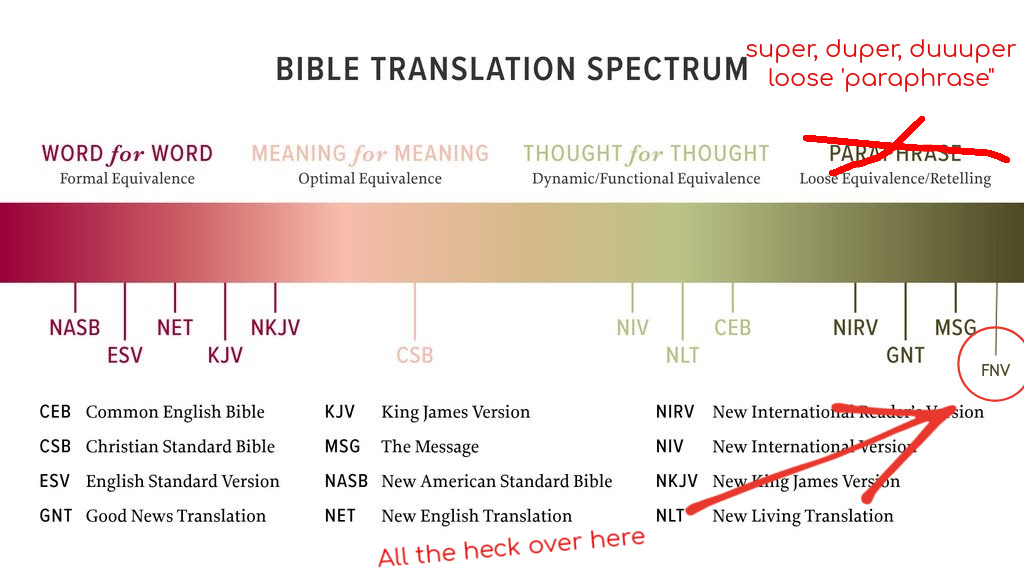
He goes on to explain that along with ‘prayers’ being referred to as “sending his voice to the Great Spirit,” they kept the same name for God that American Indians use within their own non-Christian beliefs, calling him “the Creator and Great Spirit.”
Because there are so many Marys in the New Testament, they didn’t want to use the name, but rather tweaked it to designate which Mary is being spoken about. Jesus’ Mother became “Bitter Tears”, Mary Magdalene becomes “Strong Tears” and Mary the sister of Martha becomes “Healing Tears.” Wildman told Christian Post:
“We believe it’s very important that the Gospel be kind of decolonized and told in a Native way, but being accurate to the meaning of the original language and understanding that it’s a different culture,”
As far as what it sounds like, here is a sampling:
“The Great Spirit loves this world of human beings so deeply he gave us his Son – the only Son who fully represents him. All who trust in him and his way will not come to a bad end, but will have the life of the world to come that never fades away, full of beauty and harmony. Creator did not send his Son to decide against the people of this world, but to set them free from the worthless ways of the world.” John 3:16-17
Let’s look at 1 Corinthians 6: 9-11 in the ESV. Notice no condemnation of homosexuality “Or do you not know that the unrighteous will not inherit the kingdom of God? Do not be deceived: neither the sexually immoral, nor idolaters, nor adulterers, nor men who practice homosexuality, nor thieves, nor the greedy, nor drunkards, nor revilers, nor swindlers will inherit the kingdom of God. And such were some of you. But you were washed, you were sanctified, you were justified in the name of the Lord Jesus Christ and by the Spirit of our God.’
Romans 1:16-17. ESV “For I am not ashamed of the gospel, for it is the power of God for salvation to everyone who believes, to the Jew first and also to the Greek. For in it the righteousness of God is revealed from faith for faith as it is written, “The righteous shall live by faith.”
Ephesians 3:1-6. ESV “For this reason I, Paul, a prisoner of Christ Jesus on behalf of you Gentiles— assuming that you have heard of the stewardship of God’s grace that was given to me for you, how the mystery was made known to me by revelation, as I have written briefly. When you read this, you can perceive my insight into the mystery of Christ, which was not made known to the sons of men in other generations as it has now been revealed to his holy apostles and prophets by the Spirit. This mystery is that the Gentiles are fellow heirs, members of the same body, and partakers of the promise in Christ Jesus through the gospel.”
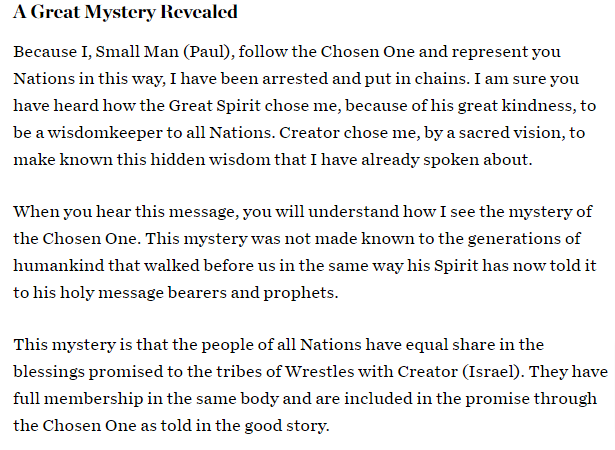
Ultimately the First Nation Version catechizes using foreign concepts that are not biblical and which Jesus never intended to say. He frequently leaves out half the things the Holy Spirit meant to include, and includes half the things that never should have been there. This is not a bible translation and would be catastrophically flawed if viewed as such.
Bonus Bibley thoughts.
The reality is that people oftentimes don’t choose a Bible to know with precision what God actually said, but rather they choose it and use it for how it makes them feel when they read it. You see this all the time in pulpits. Pastors will throw up some notes on PowerPoint and they’ll have 5 different translations/paraphrases? Why use paraphrases like the Message Bible or the FNV? Because it words things in a way that the pastor finds compelling and gripping and in which he thinks the congregation will get a kick out of, picking and choosing his pretexts.
Its also because of the modernized language that avoids theological terms that have a rich depth to them, like justification and sanctification. “Justification” has become “asking Jesus into your heart” and “Sanctification” has become “Making better choice through life principles”.
The congregants go along with using these paraphrases because of familiarity, and consequently, it has ceased being important for a translation to accurately reflect what was being said historically and in context. It has ceased being important that Jesus’ words, meaning, and intent-without additions or interpolations- are immortalized and canonized.
It has become wholly acceptable to abuse and molest the original meaning because for some people, the intent isn’t to know what the original meaning is, but rather to develop an emotional response. And as long as that emotional response is brought on by something remotely bibley, they can interpret their feelings as a spiritual encounter, which is the source of their security, affirmation, and joy.
The pastors putting out these paraphrases are not doing it so that will have a cerebral or intellectual impact, but rather an emotive one. It’s not for maximum accuracy, but for maximal sentiment. That’s the thrust of the appeal- because warm fuzzies are an easier sell than rigorous faith fullness to the text. This is shameful, sad, and embarrassing on all levels possible.
So let’s call it for what it is- a sad testament to our modern-day churchy evangelical culture that values manipulation of the text for personal gratification, over fidelity to the text for corporate sanctification.


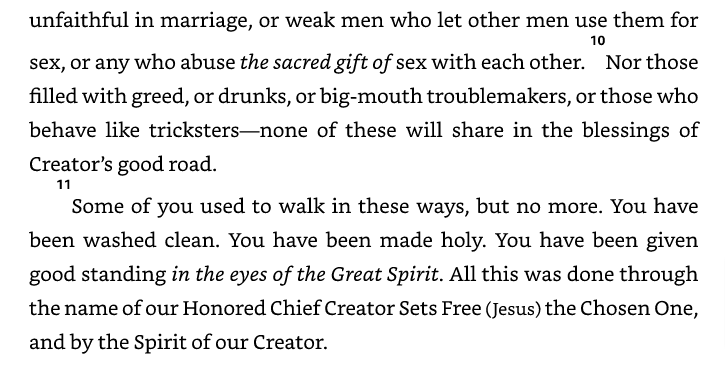
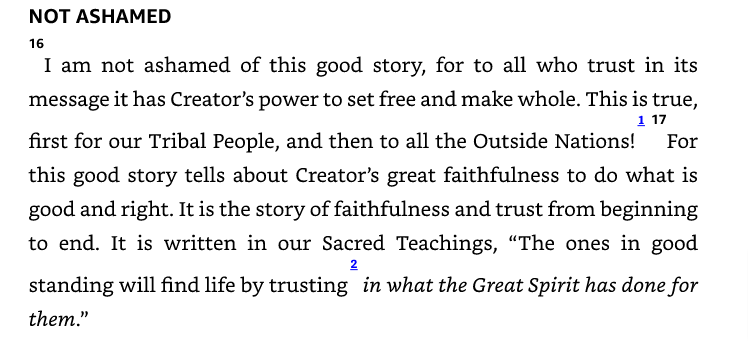





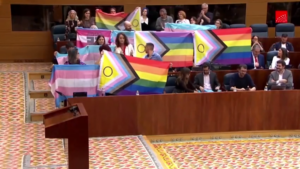
The front cover contains a blatant lie, and it gets worse from there. A translation is carefully and painstakingly translated directly from, and as close as possible to, the original manuscripts, by large teams of scholars, as accurately as possible, into a different language. Anything else is not a translation. These paraphrases of paraphrases, or paraphrases of translations invite significant cumulative error, which in several cases appears to be the real intent. And that is fairly obvious in this case, because as he admits himself, native Americans all speak English, no translation is needed, so what could possibly be the purpose.
It smells to me like he used an English translation (or paraphrase), selected certain words and phrases he wanted to change, did a global search and replace, then doctored up around the replaced text, and sent it off to be published.
I do not have a problem with paraphrasing as a tool for preaching, teaching, explaining, debating, discussion. That is basically what commentaries do to a certain extent. But you don’t call it a “translation” and you don’t publish it as the Bible. And you certainly don’t paraphrase based on paraphrase. You always refer back to the fixed, immovable reference, which is a direct translation of, as close as possible to, the original manuscripts, or better refer directly back to the original manuscripts if you have sufficient knowledge of those languages. Some will probably disagree with me, and feel free to correct me if I’m wrong, but in my experience the closest translations are the KJV, NASB, and NIV. I tend to stick with those.
Satan has been corrupting God’s Word through weak men for millennia. This is merely latest, but won’t be the last.
Just one of the many ” per-versions ” since the translation into english of GOD’s Holy Word, the “Authorised” King James Bible………………………
Right in this page I’m seeing an ad for a “Free Messianic Bible.” I wonder if that Bible has the same problems as this one.
I love that this review is attributed to “Staff Writer”, which has a decidedly First Nations feel to it. 🙂
I also appreciate the sarcasm and humor intermingled with the studied analysis of this “translation” of the Bible.
I’m curious what you believe about translation in general, not just the Bible. Which is better, word for word or paraphrase?